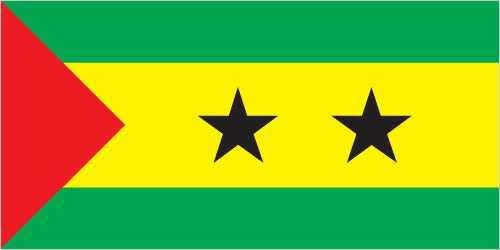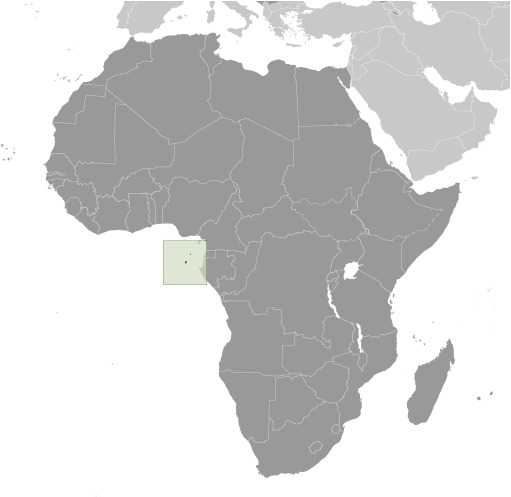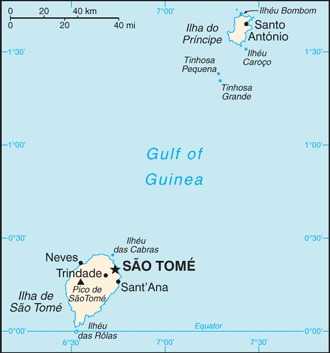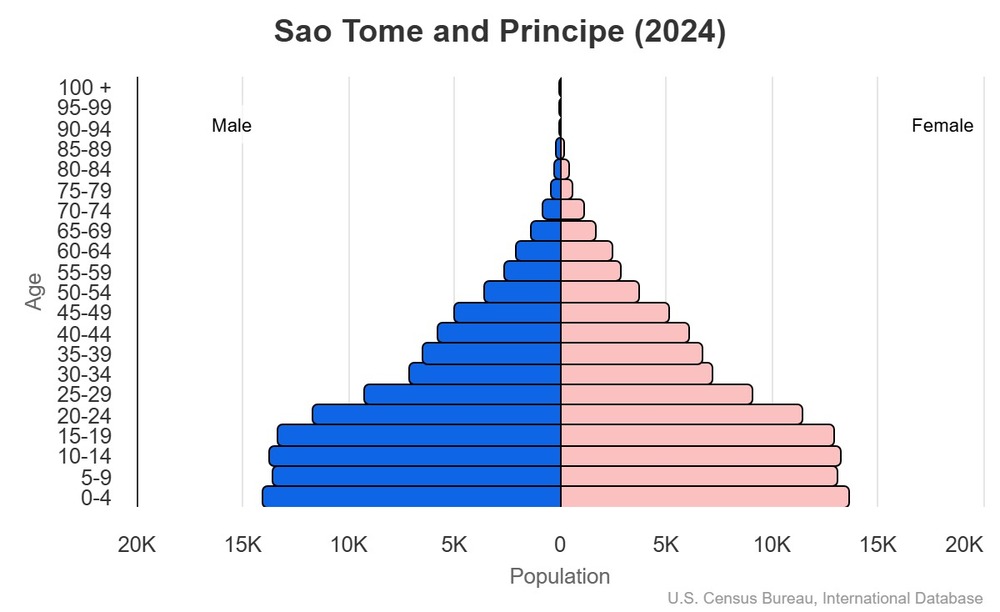São Tomé and Príncipe - ST - STP - STP - Africa



Sao Tome and Principe Images
Sao Tome and Principe Factbook Data
Diplomatic representation from the US
mailing address: 2290 Sao Tome Place, Washington DC 20521-2290
Age structure
15-64 years: 60.3% (male 67,101/female 67,775)
65 years and over: 3.2% (2024 est.) (male 3,115/female 4,127)

For additional information, please see the entry for Population pyramid on the Definitions and Notes page.
Geographic coordinates
Sex ratio
0-14 years: 1.03 male(s)/female
15-64 years: 0.99 male(s)/female
65 years and over: 0.75 male(s)/female
total population: 1 male(s)/female (2024 est.)
Natural hazards
Area - comparative
Background
Portugal discovered and colonized the uninhabited Sao Tome and Principe islands in the late 15th century, setting up a sugar-based economy that gave way to coffee and cocoa in the 19th century -- all grown with African slave labor, a form of which lingered into the 20th century. While independence was achieved in 1975, democratic reforms were not instituted until the late 1980s.
The country held its first free elections in 1991, but frequent internal wrangling among the various political parties precipitated repeated changes in leadership and failed, non-violent coup attempts in 1995, 1998, 2003, and 2009. In 2012, three opposition parties combined in a no-confidence vote to bring down the majority government of former Prime Minister Patrice TROVOADA, but legislative elections returned him to the office two years later. President Evaristo CARVALHO, of the same political party as TROVOADA, was elected in 2016, marking a rare instance in which the same party held the positions of president and prime minister. TROVOADA resigned in 2018 and was replaced by Jorge BOM JESUS. Carlos Vila NOVA was elected president in 2021. TROVOADA began his fourth stint as prime minister in 2022, after his party's victory in legislative elections.
Environmental issues
International environmental agreements
signed, but not ratified: Comprehensive Nuclear Test Ban
Population below poverty line
note: % of population with income below national poverty line
Household income or consumption by percentage share
highest 10%: 32.8% (2017 est.)
note: % share of income accruing to lowest and highest 10% of population
Exports - commodities
note: top five export commodities based on value in dollars
Exports - partners
note: top five export partners based on percentage share of exports
Administrative divisions
Agricultural products
note: top ten agricultural products based on tonnage
Military and security forces
note: the Army and Coast Guard are responsible for external security while the public security police and judicial police maintain internal security; both the public security police and the military report to the Ministry of Defense and Internal Affairs; the judicial police report to the Ministry of Justice, Public Administration, and Human Rights
Budget
expenditures: $165.95 million (2022 est.)
note: central government revenues and expenses (excluding grants/extrabudgetary units/social security funds) converted to US dollars at average official exchange rate for year indicated
Capital
geographic coordinates: 0 20 N, 6 44 E
time difference: UTC 0 (5 hours ahead of Washington, DC, during Standard Time)
etymology: named after Saint THOMAS the Apostle by the Portuguese, who discovered the island on 21 December 1470 (or 1471), the saint's feast day
Imports - commodities
note: top five import commodities based on value in dollars
Climate
Coastline
Constitution
amendment process: proposed by the National Assembly; passage requires two-thirds majority vote by the Assembly; the Assembly can propose to the president of the republic that an amendment be submitted to a referendum
Exchange rates
Exchange rates:
22.658 (2023 est.)
23.29 (2022 est.)
20.71 (2021 est.)
21.507 (2020 est.)
21.885 (2019 est.)
Executive branch
head of government: Prime Minister Américo d'Oliveira DOS RAMOS (since 12 January 2025)
cabinet: Council of Ministers proposed by the prime minister, appointed by the president
election/appointment process: president directly elected by absolute-majority popular vote in 2 rounds, if needed, for a 5-year term (eligible for a second term); prime minister chosen by the National Assembly and approved by the president
most recent election date: 18 July 2021, with a runoff on 5 September 2021
election results:
2021: Carlos Manuel VILA NOVA elected president in the second round; percent of vote in the first round - Carlos Manuel VILA NOVA (IDA) 39.5%; Guilherme POSSER DA COSTA (MLSTP-PSD) 20.8%; Delfim NEVES (PCD-GR) 16.9%; Abel BOM JESUS (independent) 3.6%; Maria DAS NEVES (independent) 3.3%; other 15.9%; percent of the vote in second round - Carlos Manuel VILA NOVA 57.5%, Guilherme POSSER DA COSTA 42.5%
2016: Evaristo CARVALHO elected president; percent of vote - Evaristo CARVALHO (ADI) 49.8%, Manuel Pinto DA COSTA (independent) 24.8%, Maria DAS NEVES (MLSTP-PSD) 24.1%
expected date of next election: 2026
Flag
meaning: green stands for the country's rich vegetation, red for the struggle for independence, and yellow for cocoa, one of the country's main agricultural products; the two stars symbolize the main islands
history: uses the colors of the Pan-African movement
Independence
Industries
Judicial branch
judge selection and term of office: Supreme Court judges appointed by the National Assembly; judge tenure NA; Constitutional Court judges nominated by the president and elected by the National Assembly for 5-year terms
subordinate courts: Court of First Instance; Audit Court
Land boundaries
Land use
arable land: 4.2% (2023 est.)
permanent crops: 39.6% (2023 est.)
permanent pasture: 1% (2023 est.)
forest: 57.5% (2023 est.)
other: 0% (2023 est.)
Legal system
Legislative branch
legislative structure: unicameral
number of seats: 55 (all directly elected)
electoral system: proportional representation
scope of elections: full renewal
term in office: 4 years
most recent election date: 9/25/2022
parties elected and seats per party: Independent Democratic Alliance (ADI) (30); Sao Tome and Principe Liberation Movement/Social Democratic Party (MLSTP - PSD) (18); Movement of Independent Citizens - Socialist Party (MCI - PS) - National Unity Party (PUN) (5); Other (2)
percentage of women in chamber: 14.5%
expected date of next election: September 2026
Literacy
male: 92.5% (2019 est.)
female: 82.8% (2019 est.)
Maritime claims
exclusive economic zone: 200 nm
note: measured from claimed archipelagic baselines
International organization participation
National holiday
Nationality
adjective: Sao Tomean
Natural resources
Geography - note
Economic overview
Political parties
Independent Democratic Action or ADI
Movement for the Liberation of Sao Tome and Principe-Social Democratic Party or MLSTP-PSD
Movement of Independent Citizens of São Tomé and Príncipe - Socialist Party or MCI-PS
National Unity Party or PUN
Suffrage
Terrain
Government type
Military - note
Country name
conventional short form: Sao Tome and Principe
local long form: Republica Democratica de Sao Tome e Principe
local short form: Sao Tome e Principe
etymology: Sao Tome was named after Saint THOMAS the Apostle by the Portuguese who discovered the island on 21 December 1470 (or 1471), the saint's feast day; Principe is a shortening of the original Portuguese name of "Ilha do Principe" (Isle of the Prince), referring to Prince ALPHONSO of Portugal
Location
Map references
Irrigated land
Diplomatic representation in the US
chancery: 122 East 42nd Street, Suite 1604
New York, NY 101168
telephone: [1] (212) 317-0533
FAX: [1] (212) 317-0580
email address and website:
stp1@attglobal.net
Sao Tome and Principe Permanent Mission to the United Nations
Internet users
Internet country code
GDP (official exchange rate)
note: data in current dollars at official exchange rate
School life expectancy (primary to tertiary education)
male: 13 years (2021 est.)
female: 13 years (2021 est.)
Urbanization
rate of urbanization: 2.96% annual rate of change (2020-25 est.)
Broadcast media
Drinking water source
urban: 79.3% of population (2022 est.)
rural: 71.1% of population (2022 est.)
total: 77.3% of population (2022 est.)
unimproved:
urban: 20.7% of population (2022 est.)
rural: 28.9% of population (2022 est.)
total: 22.7% of population (2022 est.)
National anthem(s)
lyrics/music: Alda Neves DA GRACA do Espirito Santo/Manuel dos Santos Barreto de Sousa e ALMEIDA
history: adopted 1975
Major urban areas - population
International law organization participation
Hospital bed density
National symbol(s)
Mother's mean age at first birth
note: data represents median age at first birth among women 25-29
GDP - composition, by end use
government consumption: 17.6% (2017 est.)
investment in fixed capital: 33.4% (2017 est.)
investment in inventories: 0% (2017 est.)
exports of goods and services: 7.9% (2017 est.)
imports of goods and services: -40.4% (2017 est.)
Citizenship
citizenship by descent only: at least one parent must be a citizen of Sao Tome and Principe
dual citizenship recognized: no
residency requirement for naturalization: 5 years
Population distribution
Electricity access
electrification - urban areas: 80%
electrification - rural areas: 73.7%
Civil aircraft registration country code prefix
Sanitation facility access
urban: 56.8% of population (2022 est.)
rural: 43.2% of population (2022 est.)
total: 53.5% of population (2022 est.)
unimproved:
urban: 43.2% of population (2022 est.)
rural: 56.8% of population (2022 est.)
total: 46.5% of population (2022 est.)
Ethnic groups
Religions
Languages
note: shares of language sum to more than 100% because some respondents gave more than one answer on the census
Imports - partners
note: top five import partners based on percentage share of imports
Elevation
lowest point: Atlantic Ocean 0 m
Physician density
Health expenditure
14.9% of national budget (2022 est.)
Military and security service personnel strengths
Military equipment inventories and acquisitions
Total water withdrawal
industrial: 600,000 cubic meters (2022 est.)
agricultural: 25.6 million cubic meters (2022 est.)
Total renewable water resources
Waste and recycling
percent of municipal solid waste recycled: 16.9% (2022 est.)
Child marriage
women married by age 18: 28% (2019)
men married by age 18: 3.1% (2019)
Electricity generation sources
hydroelectricity: 6.8% of total installed capacity (2023 est.)
Petroleum
Gross reproduction rate
Currently married women (ages 15-49)
Remittances
1.9% of GDP (2022 est.)
2% of GDP (2021 est.)
note: personal transfers and compensation between resident and non-resident individuals/households/entities
Ports
large: 0
medium: 0
small: 0
very small: 2
ports with oil terminals: 0
key ports: Santo Antonio, Sao Tome
National color(s)
Particulate matter emissions
Labor force
note: number of people ages 15 or older who are employed or seeking work
Youth unemployment rate (ages 15-24)
male: 8% (2024 est.)
female: 9.2% (2024 est.)
note: % of labor force ages 15-24 seeking employment
Net migration rate
Median age
male: 20.4 years
female: 21.2 years
Debt - external
note: present value of external debt in current US dollars
Maternal mortality ratio
Reserves of foreign exchange and gold
$64.476 million (2022 est.)
$75.017 million (2021 est.)
note: holdings of gold (year-end prices)/foreign exchange/special drawing rights in current dollars
Total fertility rate
Unemployment rate
9.1% (2023 est.)
9% (2022 est.)
note: % of labor force seeking employment
Carbon dioxide emissions
from petroleum and other liquids: 146,000 metric tonnes of CO2 (2023 est.)
Area
land: 964 sq km
water: 0 sq km
Real GDP (purchasing power parity)
$1.279 billion (2023 est.)
$1.275 billion (2022 est.)
note: data in 2021 dollars
Airports
Infant mortality rate
male: 46.1 deaths/1,000 live births
female: 39 deaths/1,000 live births
Gini Index coefficient - distribution of family income
note: index (0-100) of income distribution; higher values represent greater inequality
Inflation rate (consumer prices)
21.3% (2023 est.)
18% (2022 est.)
note: annual % change based on consumer prices
Current account balance
-$95.248 million (2021 est.)
-$59.595 million (2020 est.)
note: balance of payments - net trade and primary/secondary income in current dollars
Real GDP per capita
$5,500 (2023 est.)
$5,600 (2022 est.)
note: data in 2021 dollars
Broadband - fixed subscriptions
subscriptions per 100 inhabitants: 3 (2023 est.)
Tobacco use
male: 13.1% (2025 est.)
female: 1.7% (2025 est.)
Obesity - adult prevalence rate
Energy consumption per capita
Death rate
Birth rate
Electricity
consumption: 47.05 million kWh (2023 est.)
transmission/distribution losses: 40.95 million kWh (2023 est.)
Merchant marine
by type: general cargo 15, oil tanker 4, other 6
Children under the age of 5 years underweight
Imports
$201.145 million (2021 est.)
$160.097 million (2020 est.)
note: balance of payments - imports of goods and services in current dollars
Exports
$75.256 million (2021 est.)
$49.337 million (2020 est.)
note: balance of payments - exports of goods and services in current dollars
Alcohol consumption per capita
beer: 0.42 liters of pure alcohol (2019 est.)
wine: 3.58 liters of pure alcohol (2019 est.)
spirits: 0.23 liters of pure alcohol (2019 est.)
other alcohols: 0 liters of pure alcohol (2019 est.)
Life expectancy at birth
male: 66 years
female: 69.4 years
Real GDP growth rate
0.4% (2023 est.)
0.2% (2022 est.)
note: annual GDP % growth based on constant local currency
Industrial production growth rate
note: annual % change in industrial value added based on constant local currency
GDP - composition, by sector of origin
industry: 2.9% (2024 est.)
services: 76.6% (2024 est.)
note: figures may not total 100% due to non-allocated consumption not captured in sector-reported data
Education expenditure
18.1% national budget (2024 est.)
Population growth rate
Military service age and obligation
Dependency ratios
youth dependency ratio: 58.4 (2025 est.)
elderly dependency ratio: 5.5 (2025 est.)
potential support ratio: 18.2 (2025 est.)
Population
male: 113,129
female: 113,593
Telephones - mobile cellular
subscriptions per 100 inhabitants: 62 (2024 est.)
Telephones - fixed lines
subscriptions per 100 inhabitants: (2024 est.) less than 1
